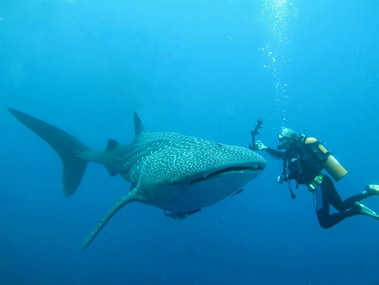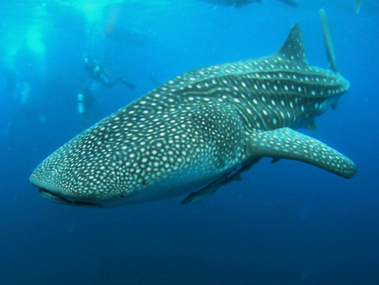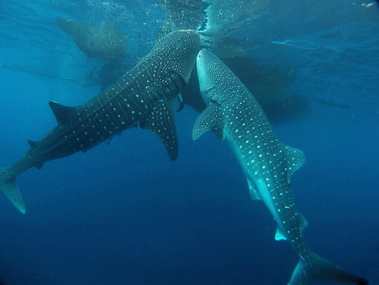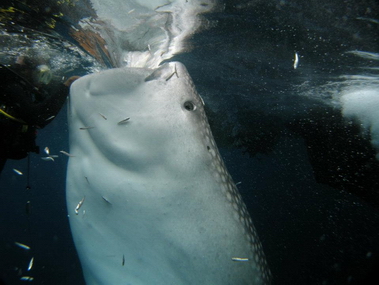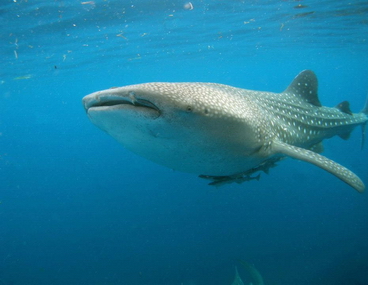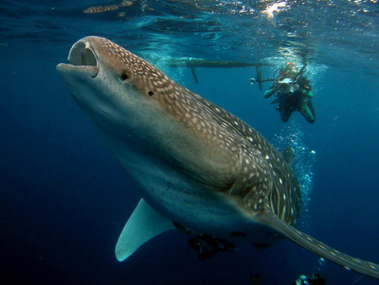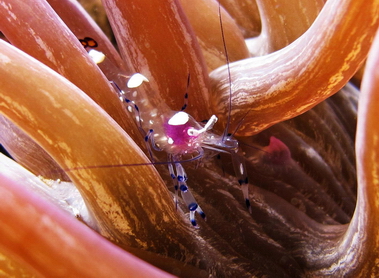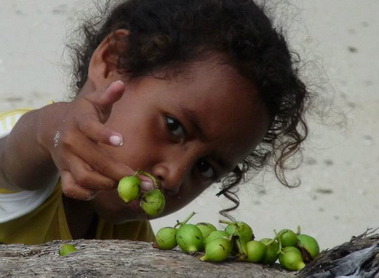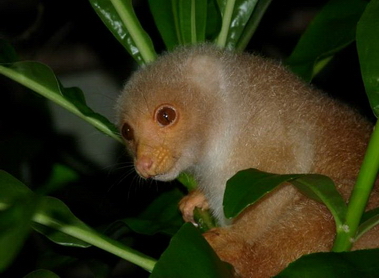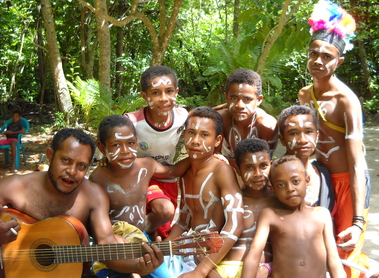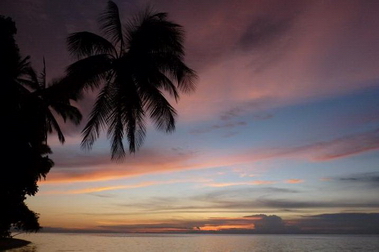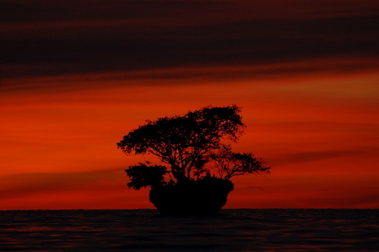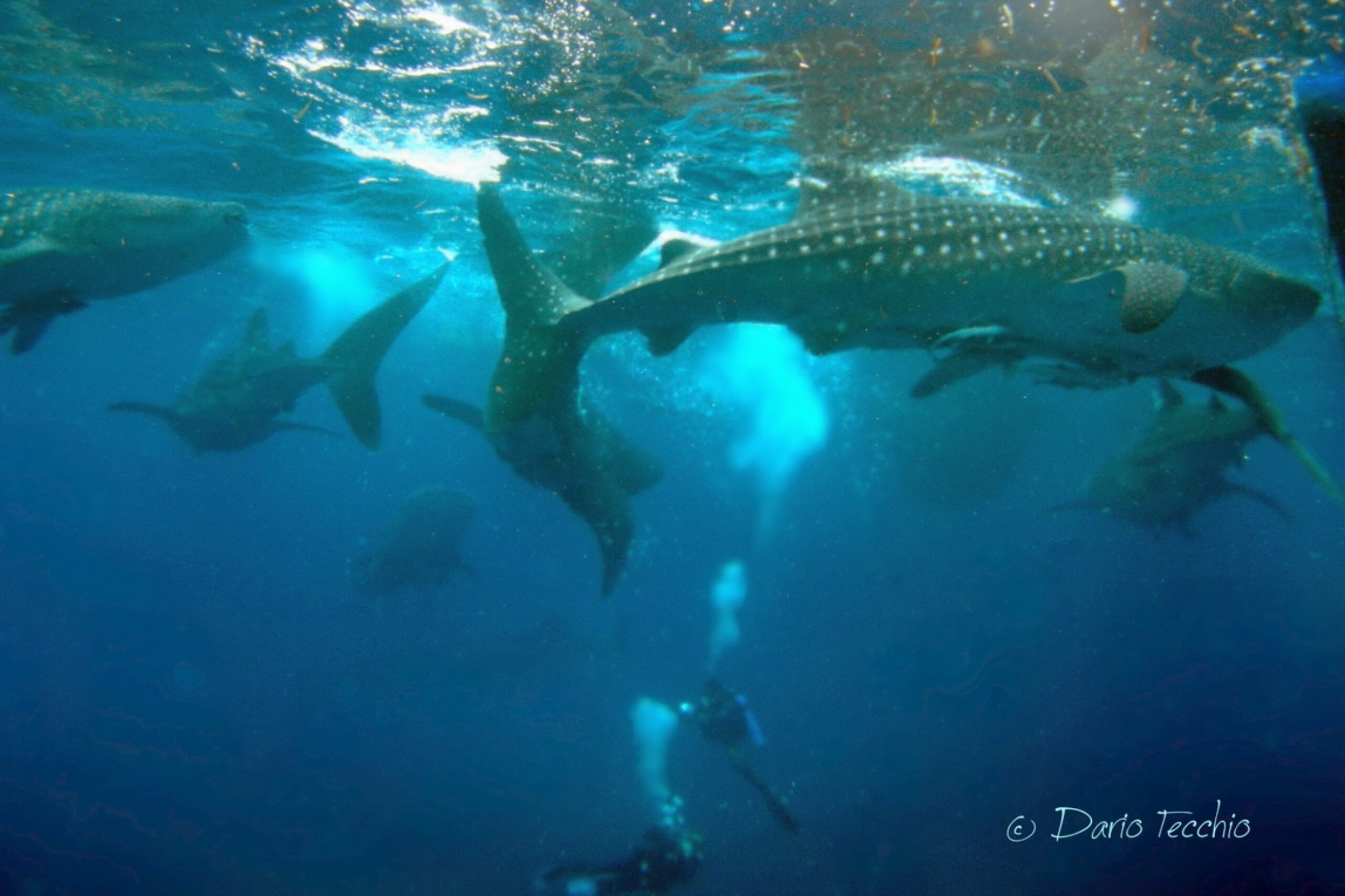
Cenderawasih Bay
Cenderawasih Bay
Whale Shark Diving Expeditions
Indonesia’s whale sharks sanctuary: Cenderawasih, an immense bay that homes one of the most largest marine park in Indonesia and the only place in the world where it is possible to see such a large number of whale sharks and with such ease, and not only by diving, but simply by snorkelling or swimming. The many artificial reefs formed by the wreckage of air and sea craft strewn across the bay since WW2 are another important call.
1. DIVING WITH WHALE SHARKS
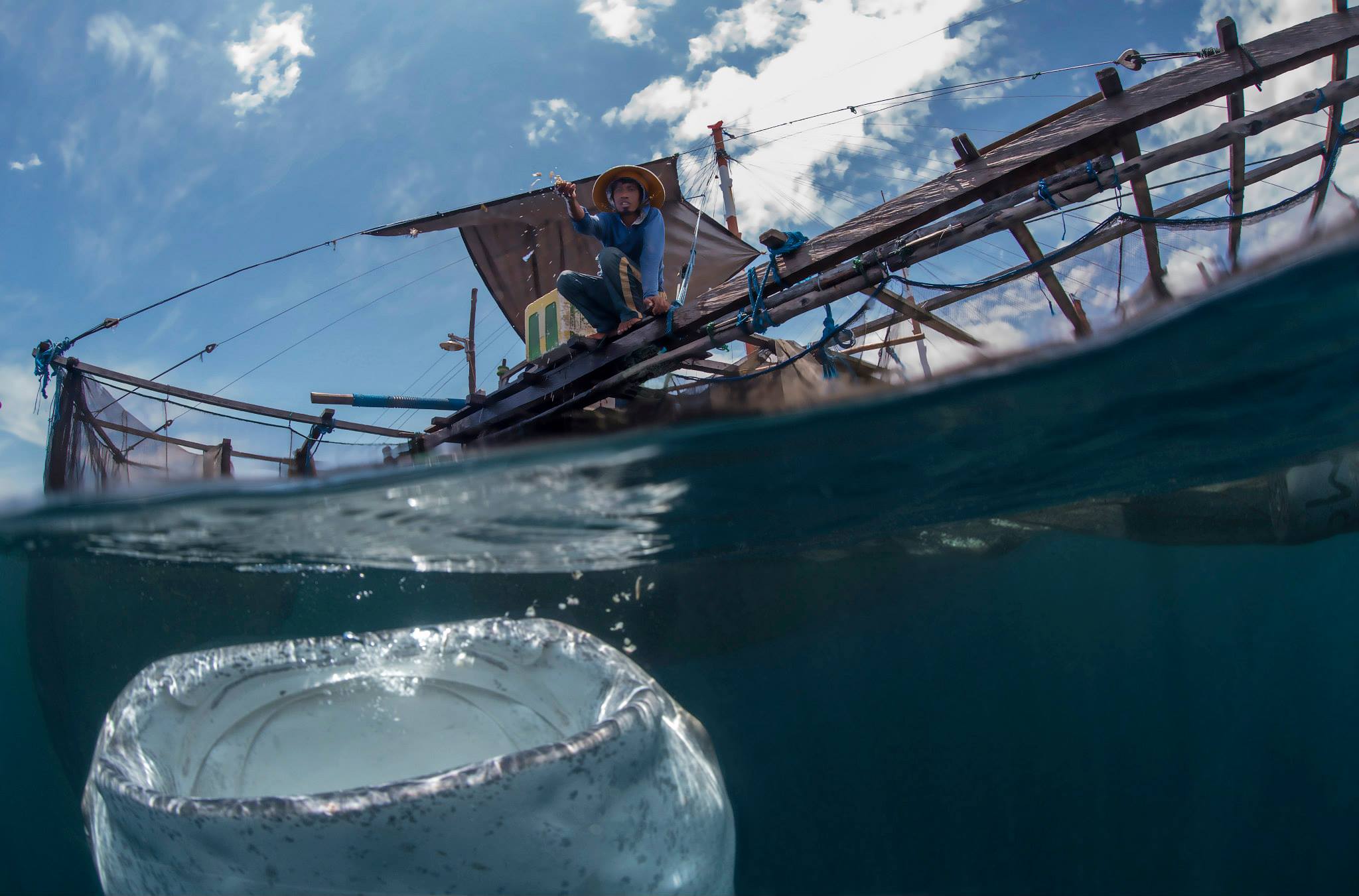
A consistent population of whale sharks daily frequent the local fishermen platforms -called “bagan”-, attracted by the fishing of “ikan puri”, small fish similar to sardines, of which they are greedy. The bagans are make-shift floating platforms built from giant bamboo canes, that are then anchored for long periods areas deemed to be rich in fish.
In 2010, the behavior of Cenderawasih whale sharks began to be studied and it was discovered that they are ever-present in the bay, and are not put off by the divers, and even allow themselves to be hand-fed by the locals. There are few if any other dive sites in the world were a diver can enjoy such an exhilarating dive up so close to whale sharks for the entire duration of the dive. On average 5 whales sharks are seen per a dive in Cenderawasih, up to a maximum of 12-15 whale sharks on a single dive. Lately it has been discovered that sailfish, marlins and other pelagics can be found down the ropes that anchor the bagan to the seabed, at depths close to 40m.
Liveaboard diving in Cenderawasih Bay
Since 2011, a handful of the more adventurous dive boats have begun to schedule dive cruises in Cenderawasih Bay, which is now served regularly in some seasons of the year, while in others is only on request for full boat rental or charter.
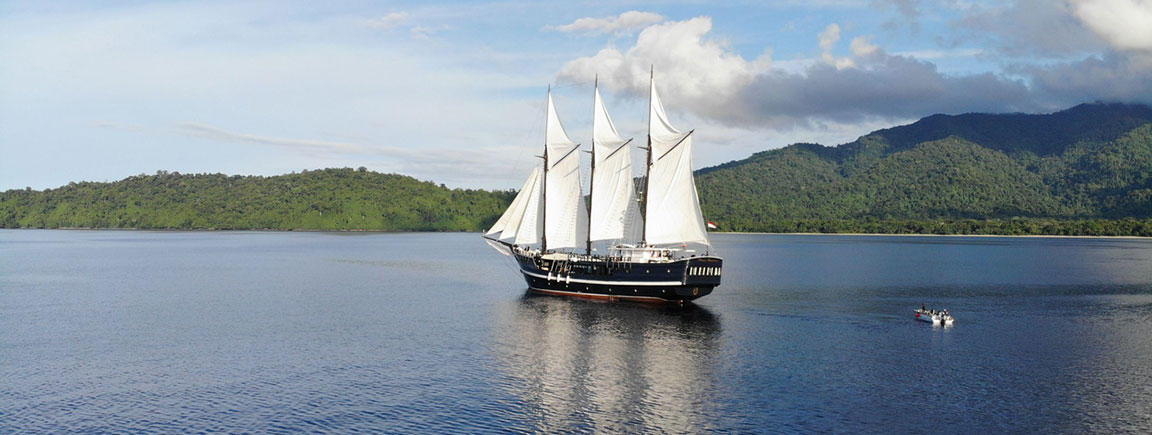
The only way to enjoy the diving with whale sharks experience in Cendrawasih Bay is with a dive cruise or liveaboard, contact now a Liveaboard Specialist
2. DIVE SITES
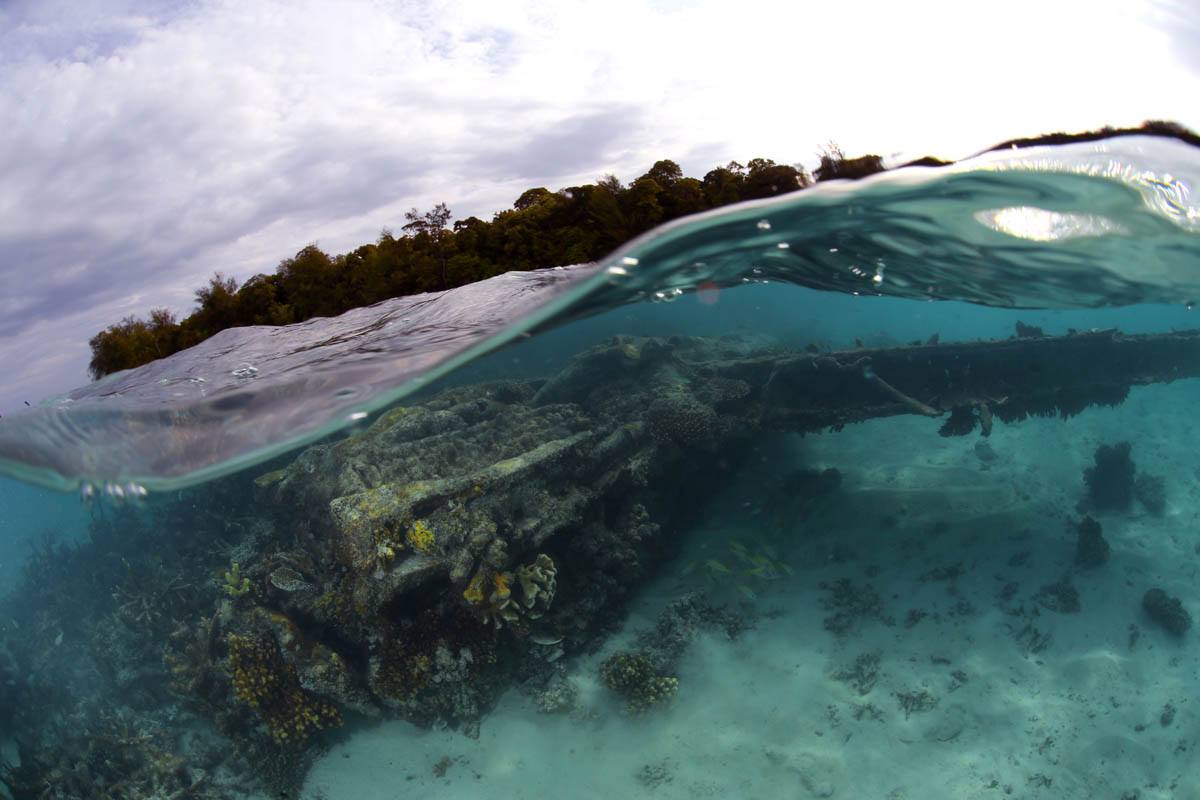
At the time of writing, some of the dive points discovered during exploratory expeditions have been established as dive sites and are now part of the regular itinerary for liveaboards visiting Cenderawasih Bay. Besides being a diving destination to easily interact with whale sharks, Cenderawasih Bay also offers great diving in colorful reefs, amazing wrecks, and rare critters.
Diving the Manokwari wrecks
On the seabed of the Gulf of Doreri, near the town of Manokwari, are numerous Japanese shipwrecks sunk during the World War II. Currently there are 6 wrecks open to divers, with the other wrecks either sat too deep for exploration or not yet located.
The Manokwari wrecks are covered in corals and home to an enormous variety of sea life. Inside the boats and on the decks you can still see cases of grenades, ammunition, helmets, bicycles, bottles, pots, pans and plates, etc. On some of the wrecks you can visit the machine rooms and the radio station. The largest ship wreck in the Manokwari Gulf is the Shinwa Maru, a huge 120m long cargo ship lying on its port side at 35 meters, that is relatively intact.

Other WW2 wrecks to visit depending of your itinerary: zero plane wreck in the south of Pulau Roon, three P-38 Lightning fighter planes laying in front of the beach just in 1 meter of water at Pulau Roaw, eight different US landing craft near Pulau Manin and Pulau Dua, Japanese Oscar fighter plane off Pulau Rippon, two Japanese wrecks in the Manokwari Bay, PBY aircraft Catalina Flying Boat in Pulau Biak, and the exploration continue…
Wide angle, macro, and critters
Until recent times, the Cenderawasih Bay remained isolated and cut off other seas. This natural phenomenon prevented the exchange of larvae with other seas and the evolution of a large quantity of species endemic to the region. It is also interesting to note that many fish that would normally live in very deep seas, are found living Cenderawasih Bay in relatively shallow waters.
The reefs and underwater walls of Cenderawasih Bay are teaming with macro marine life, from pigmy seahorses to needle ghost fish, rare shrimps and crabs, and bizarre nudibranchs as phyllidia ocellata. The hard corals are particularly colourful, and sponges are often found on the walls.
3. DIVING SEASON

Diving season: All year round, ideal from October to April -more wind and rain in the other months. Rainy season: From December to March. Water temperature: 27-30°C. Visibility: 10-30m. Depths: 5 – >40m. Currents: Moderate. Surface conditions: Calm. Diver level experience: All levels. Dive sites: Known, at the present >50. Length of stay: Recommended 7-10 days on liveaboard cruise.
4. HOW TO GET THERE
Airport: Manokwari. Biak. International flights reach Jakarta and then domestic flights to Manokwari or Biak. Weather: 27-35°C. In West Papua the rainy season runs from December to March, always considering that being at the Equator, the weather patron is punctual rain showers in evening or night with sunny days with blue skies. Time zone: West Papua GMT +9. Transit night & connecting flight: You may need to spend one night in transit in Indonesia before and/or after your cruise, depending on your domestic and international flight schedules. We have the most competitive airfares with the most convenient flight timetables, and hotels for all budgets.
Does it seem complicated? Contact an operator who speaks your language and who can assist you in Indonesia. Feel free to contact us now!
5. CENDRAWASIH BAY CHARTERS
Cenderawasih Bay is a liveaboard destination, sometimes combined with Raja Ampat, so the only way to visit this region of Indonesia is by cruise. In recent years, other areas of the bay have been explored, discovering excellent sites for macro and beautiful coral reefs. Cruising Indonesia offers in case of a full charter the possibility of combining Cendrawasih with Mapia atoll, a place rich in pelagic, located in the open sea to the north of the bay. One of the many places still to be explored in this endless land of oceans.

Planning your private charter
• Experience the meaning of pristine land and seascapes by diving, snorkeling or swimming, on an entire region of Indonesia still unspoiled and almost uninhabited.
• Appreciate the particular flora and fauna of this extreme oriental region of Indonesia: the West Papua.
• Meet the islanders and visiting some of the isolated Cenderawasih’s village, to learn about their Austronesian language -differed from bahasa Indonesia-, their traditional ways of subsistence: agriculture, hunt, and fishing, that is unbelievable for our days.
• The smile of the beautiful Papuan people is something that surely will remain in your memories of this travel cruise.
• Learn about the Battle of Biak and the Pacific War by visiting the Japanese caves and the War Memorial on a land tour of the island. Divers flying to or from Biak for a Cenderawasih dive trip only need half a day for this program.
Cenderawasih Bay Private Cruises
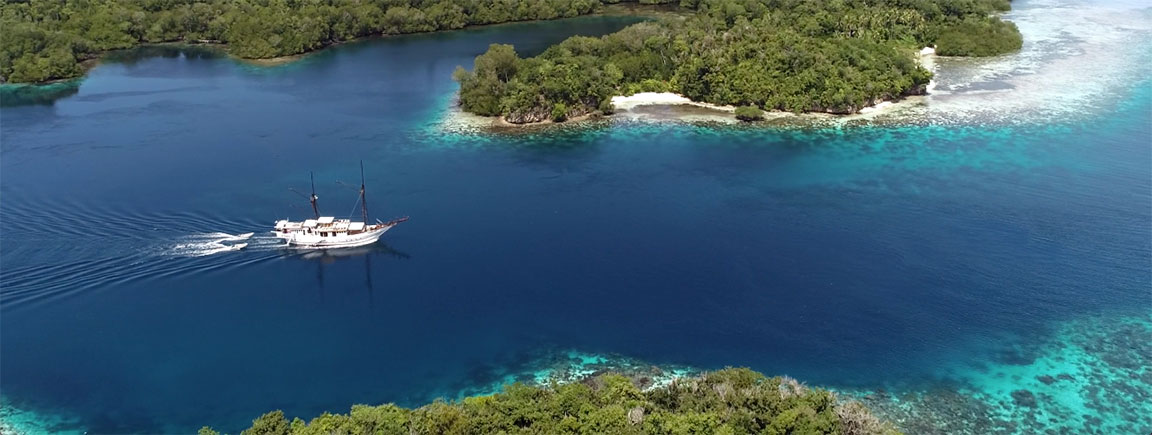
Plan your diving adventure with a Liveaboard Specialist and you will positively see the whale sharks of Cendarawasih Bay in your next diving travel!
Cruising Indonesia | The Liveaboard & Dive Specialists
Cruising Indonesia is committed to ensuring you not only a perfect diving holiday but also the best price guarantee. Contact us and we will arrange everything you need: every single details of your cruise reservation, the international & domestic flights, the ground services, an amazing tour extension…
Reserve Cenderawasih Bay now!
